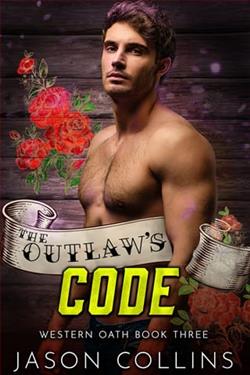
The Outlaw's Code
by Jason Collins
CALDER:
When I wake up, I’m face down in the dirt—head bleeding, no memory. Just a photo of a woman I don’t recognize.
They say I had a name. A life. A girlfriend waiting.
But none of it feels right.
What does feel right is Shane—the man who keeps showing up at my door with steady hands and quiet eyes. He’s not part of the life I’m supposed to remember. But I lean toward him without thinking.
If forgetting brought me to him, I hope I never remember.
SHANE:
I know who Calder is. Seen him around town—rugged, straight, completely off-limits.
So when I find him unconscious on Stratton land with no ID and no clue who he is, I figure he’ll be gone as soon as he remembers.
But every day Calder stays, it gets harder. The way he lingers feels less like confusion and more like choice.
I should keep my distance. I’ve been here before—falling for a straight guy, hoping for something that never comes.
Now I’m not sure what would hurt more: giving in or letting go.
This is the third book in the Western Oath series. It can be read as a standalone with no cliffhanger.
.
Read
The Outlaw's Code on http://kissnovel.net
Martial Peak Reviews
Jason Collins' The Outlaw's Code, the third installment in the Western Oath series, is a compelling exploration of identity, memory, and unexpected love set against the rugged backdrop of the American West. While it can be read as a standalone novel, it seamlessly integrates into the series, offering a fresh narrative that captivates both returning readers and newcomers alike.
The story opens with a gripping scene: Calder, the protagonist, wakes up face down in the dirt, suffering from amnesia. With no memory of his past life, he clings to a photograph of a woman he doesn't recognize. This intriguing premise sets the stage for a journey of self-discovery, where Calder must navigate the complexities of his forgotten past while grappling with the present reality that feels foreign yet strangely comforting.
One of the most compelling aspects of The Outlaw's Code is its exploration of identity and the fluidity of self. Calder's amnesia serves as a metaphor for the universal quest to understand who we are beyond the labels and roles society assigns us. As Calder attempts to piece together his past, he is confronted with the possibility that the life he is supposed to remember may not align with his true self. This internal conflict is beautifully portrayed through Collins' nuanced writing, which captures the tension between memory and desire.
Enter Shane, a character who embodies the quiet strength and resilience often romanticized in Western narratives. Shane's initial reluctance to get involved with Calder is rooted in past experiences of unrequited love, adding depth to his character. His internal struggle is palpable, as he battles between maintaining a safe distance and succumbing to the undeniable connection he feels with Calder. Collins expertly crafts Shane's character, making him both relatable and endearing.
The chemistry between Calder and Shane is electric, and their evolving relationship forms the emotional core of the novel. Collins deftly navigates the complexities of their dynamic, capturing the push and pull of attraction and the fear of vulnerability. The tension between them is palpable, and their interactions are charged with an intensity that keeps readers engaged. As Calder leans toward Shane, the narrative explores themes of choice and agency, challenging the notion of predetermined paths and highlighting the power of personal decisions in shaping one's destiny.
Collins' portrayal of the Western setting adds an additional layer of richness to the narrative. The rugged landscapes and small-town dynamics serve as both a backdrop and a character in their own right, influencing the story's progression and the characters' interactions. The author's attention to detail in describing the setting immerses readers in the world of the novel, creating a vivid sense of place that enhances the overall reading experience.
In terms of character development, Collins excels in crafting multidimensional characters who undergo significant growth throughout the story. Calder's journey from confusion to self-awareness is both compelling and relatable, as he grapples with the tension between his past and present. Shane's evolution is equally engaging, as he learns to confront his fears and embrace the possibility of love. The supporting characters, though less prominent, are well-developed and contribute to the richness of the narrative.
While The Outlaw's Code is a romance at its core, it transcends the genre by delving into deeper themes of identity, memory, and the courage to embrace one's true self. Collins' writing is both evocative and poignant, capturing the emotional nuances of the characters' journeys with sensitivity and grace. The novel's pacing is well-balanced, allowing for moments of introspection and tension without sacrificing the momentum of the plot.
In comparison to other works in the genre, The Outlaw's Code stands out for its thoughtful exploration of identity and its nuanced portrayal of a same-sex relationship in a traditionally heteronormative setting. Fans of authors like Heidi Cullinan and Roe Horvat will appreciate Collins' ability to blend romance with deeper thematic elements, creating a story that resonates on multiple levels.
Overall, The Outlaw's Code is a beautifully crafted novel that offers a fresh take on the Western romance genre. With its compelling characters, evocative setting, and exploration of identity and choice, it is a story that lingers long after the final page is turned. Whether you're a fan of the series or a newcomer to Collins' work, this novel is sure to captivate and inspire.
























Reviews 0
Post a Reviews: